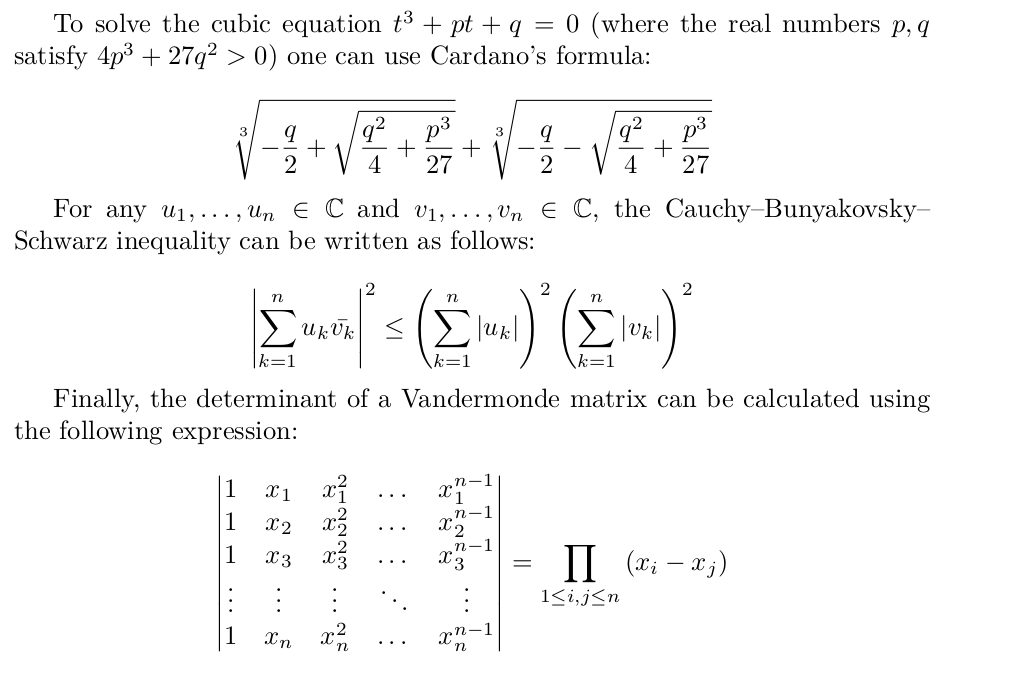三个著名的数学公式
| 先决条件 | 在尝试此评估之前,您应该已经完成了本模块中的所有文章,并且还应该了解 HTML 基础知识(学习 HTML 简介)。 |
|---|---|
| 目标 | 尝试使用一些 MathML 并测试您新学到的知识。 |
一篇简短的数学文章
目标是使用 HTML 和 MathML 重写以下数学文章

虽然您不需要熟悉 LaTeX,但了解生成它的 LaTeX 源代码可能会有用。
latex
\documentclass{article}
\usepackage{amsmath}
\usepackage{amssymb}
\begin{document}
To solve the cubic equation $t^3 + pt + q = 0$ (where the real numbers
$p, q$ satisfy ${4p^3 + 27q^2} > 0$) one can use Cardano's formula:
\[
\sqrt[{3}]{
-\frac{q}{2}
+\sqrt{\frac{q^2}{4} + {\frac{p^{3}}{27}}}
}+
\sqrt[{3}]{
-\frac{q}{2}
-\sqrt{\frac{q^2}{4} + {\frac{p^{3}}{27}}}
}
\]
For any $u_1, \dots, u_n \in \mathbb{C}$ and
$v_1, \dots, v_n \in \mathbb{C}$, the Cauchy–Bunyakovsky–Schwarz
inequality can be written as follows:
\[
\left| \sum_{k=1}^n {u_k \bar{v_k}} \right|^2
\leq
{
\left( \sum_{k=1}^n {|u_k|} \right)^2
\left( \sum_{k=1}^n {|v_k|} \right)^2
}
\]
Finally, the determinant of a Vandermonde matrix can be calculated
using the following expression:
\[
\begin{vmatrix}
1 & x_1 & x_1^2 & \dots & x_1^{n-1} \\
1 & x_2 & x_2^2 & \dots & x_2^{n-1} \\
1 & x_3 & x_3^2 & \dots & x_3^{n-1} \\
\vdots & \vdots & \vdots & \ddots & \vdots \\
1 & x_n & x_n^2 & \dots & x_n^{n-1} \\
\end{vmatrix}
= {\prod_{1 \leq {i,j} \leq n} {(x_i - x_j)}}
\]
\end{document}
起点
要开始此评估,您可以依靠我们常用的 HTML 模板。默认情况下,它使用 UTF-8 编码,为 <body> 和 <math> 标签使用特殊的 Web 字体(与 LaTeX 输出的外观和感觉相似)。目标是用实际的 MathML 内容替换问号 ???。
html
<!doctype html>
<html lang="en-US">
<head>
<meta charset="utf-8" />
<title>Three famous mathematical formulas</title>
<link
rel="stylesheet"
href="https://fred-wang.github.io/MathFonts/LatinModern/mathfonts.css" />
</head>
<body class="htmlmathparagraph">
<p>
To solve the cubic equation ??? (where the real numbers ??? satisfy ???)
one can use Cardano's formula: ???
</p>
<p>
For any ??? and ???, the Cauchy–Bunyakovsky–Schwarz inequality can be
written as follows: ???
</p>
<p>
Finally, the determinant of a Vandermonde matrix can be calculated using
the following expression: ???
</p>
</body>
</html>
提示和技巧
- 首先插入空的
<math>标签,并决定它们是否应该具有display="block"属性。 - 检查使用的文本并查找其 Unicode 字符(“−”, “ℂ”, “∑”,...)。
- 分析文本的每个部分的语义(变量?运算符?数字?),并确定每个部分使用的适当标记元素。
- 寻找高级结构(分数?根?脚本?矩阵?)并确定每个结构使用的适当 MathML 元素。
- 不要忘记依靠
<mrow>来对子表达式进行分组。 - 注意可伸缩运算符和大型运算符!
- 使用 W3C 验证器 来捕获 HTML/MathML 标记中的意外错误。
- 如果您卡住了,或者意识到手动编写 MathML 是多么痛苦,请随时使用工具来帮助 编写 MathML,例如 TeXZilla。